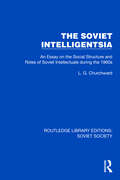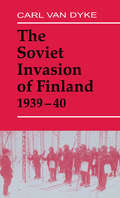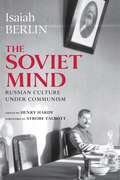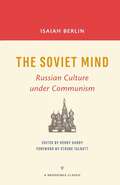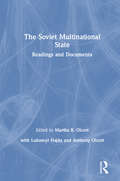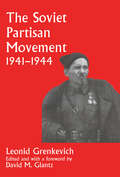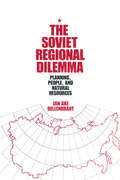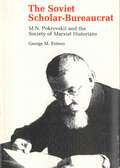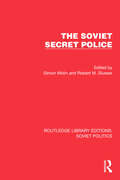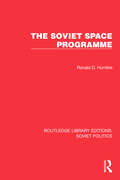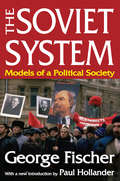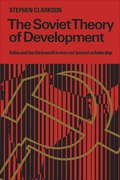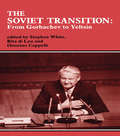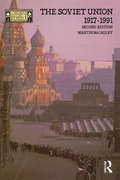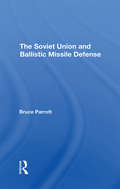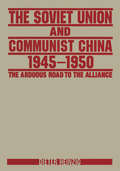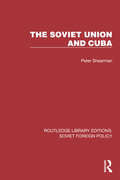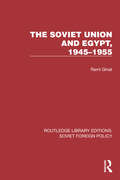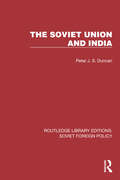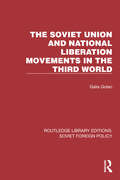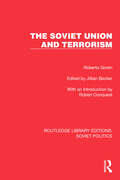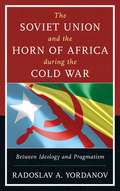- Table View
- List View
The Soviet Intelligentsia: An Essay on the Social Structure and Roles of Soviet Intellectuals in the 1960s (Routledge Library Editions: Soviet Society)
by L.G. ChurchwardThe Soviet Intelligentsia (1973) is a valuable study of the composition and structure of the Soviet intelligentsia during the 1960s. It focuses in particular on the position of social scientists and the relationship between the intelligentsia and the Communist party. The book contains much original material drawn from Soviet newspapers, books and periodicals, and from the personal experiences of the author in the Soviet Union. It discusses the problem of defining the intelligentsia, their social spread, recruitment and training, as well as Soviet intellectual culture and lifestyles, the social and political roles of the intelligentsia and the likely future of this distinctive group in the Soviet system.
The Soviet Invasion of Finland, 1939-40 (Soviet (Russian) Military Experience #No. 3)
by Carl Van DykeWestern accounts of the Soviet-Finnish war have been reliant on Western sources. Using Russian archival and previously classified secondary sources to document the experience of the Red Army in conflict with Finland, Carl Van Dyke offers a reassessment of the conflict.
The Soviet Mind
by Isaiah Berlin Henry Hardy Strobe TalbottIsaiah Berlin's response to the Soviet Union was central to his identity, both personally and intellectually. Born a Russian subject in Riga in 1909, he spoke Russian as a child and witnessed both revolutions in St. Petersburg in 1917, emigrating to the West in 1921. He first returned to Russia in 1945, when he met the writers Anna Akhmatova and Boris Pasternak. These formative encounters helped shape his later work, especially his defense of political freedom and his studies of pre-Soviet Russian thinkers. Never before collected, Berlin's writings about the USSR include his accounts of his famous meetings with Russian writers shortly after the Second World War; the celebrated 1945 Foreign Office memorandum on the state of the arts under Stalin; his account of Stalin's manipulative 'artificial dialectic'; portraits of Osip Mandel´shtam and Boris Pasternak; his survey of Soviet Russian culture written after a visit in 1956; a postscript stimulated by the events of 1989; and more. This collection includes essays that have never been published before, as well as works that are not widely known because they were published under pseudonyms to protect relatives living in Russia. The contents of this book were discussed at a seminar in Oxford in 2003, held under the auspices of the Brookings Institution. Berlin's editor, Henry Hardy, had prepared the essays for collective publication and here recounts their history. In his foreword, Brookings president Strobe Talbott, an expert on the Soviet Union, relates the essays to Berlin's other work. The Soviet Mind will assume its rightful place among Berlin's works and will prove invaluable for policymakers, students, and those interested in Russian politics, past, present and future.
The Soviet Mind
by Isaiah Berlin Henry Hardy Strobe TalbottIsaiah Berlin's response to the Soviet Union was central to his identity, both personally and intellectually. Born a Russian subject in Riga in 1909, he spoke Russian as a child and witnessed both revolutions in St. Petersburg in 1917, emigrating to the West in 1921. He first returned to Russia in 1945, when he met the writers Anna Akhmatova and Boris Pasternak. These formative encounters helped shape his later work, especially his defense of political freedom and his studies of pre-Soviet Russian thinkers. Never before collected, Berlin's writings about the USSR include his accounts of his famous meetings with Russian writers shortly after the Second World War; the celebrated 1945 Foreign Office memorandum on the state of the arts under Stalin; his account of Stalin's manipulative 'artificial dialectic'; portraits of Osip Mandel´shtam and Boris Pasternak; his survey of Soviet Russian culture written after a visit in 1956; a postscript stimulated by the events of 1989; and more. This collection includes essays that have never been published before, as well as works that are not widely known because they were published under pseudonyms to protect relatives living in Russia. The contents of this book were discussed at a seminar in Oxford in 2003, held under the auspices of the Brookings Institution. Berlin's editor, Henry Hardy, had prepared the essays for collective publication and here recounts their history. In his foreword, Brookings president Strobe Talbott, an expert on the Soviet Union, relates the essays to Berlin's other work. The Soviet Mind will assume its rightful place among Berlin's works and will prove invaluable for policymakers, students, and those interested in Russian politics, past, present and future.
The Soviet Mind: Russian Culture under Communism
by Isaiah Berlin Henry Hardy Strobe Talbott"Berlin's great powers of observation combine with his great knowledge and literary gifts to provide us with a fascinating series of insights."-Geoffrey RiklinGeorge Kennan, the architect of U.S. policy toward the Soviet Union, called Isaiah Berlin "the patron saint among the commentators of the Russian scene." In The Soviet Mind, Berlin proves himself worthy of that accolade. Although the essays in this book were originally written to explore tensions between Soviet communism and Russian culture, the thinking about the Russian mind that emerges is as relevant today under Putin's post-communist Russia as it was when this book first appeared more than a decade ago.This Brookings Classic brings together Berlin's writings about the Soviet Union. Among the highlights are accounts of Berlin's meetings with Russian writers in the aftermath of the war; a celebrated memorandum written for the British Foreign Office in 1945 about the state of the arts under Stalin; Berlin's account of Stalin's manipulative "artificial dialectic"; portraits of Pasternak and poet Osip Mandel'shtam; Berlin's survey of Russian culture based on a visit in 1956; and a postscript reflecting on the fall of the Berlin Wall and other events in 1989.Henry Hardy prepared the essays for publication; his introduction describes their history. In his revised foreword, Brookings' Strobe Talbott, a longtime expert on Russia and the Soviet Union, relates the essays to Berlin's other work.The essays and other pieces in The Soviet Mind-including a new essay, "Marxist versus Non-Marxist Ideas in Soviet Policy"-represent Berlin at his most brilliant and are invaluable for policymakers, students, and anyone interested in Russian politics and thought-past, present, and future.
The Soviet Multinational State
by Martha Brill Olcott Anthony Olcott Lubomyr HajdaThe Soviet Union is a multinational state, with about half of the country's population being ethnically Russian. The advent of glasnost, and moves toward democratization and decentralization has unleashed the expression of national sentiments and interests in the USSR. This collection of Soviet materials surveys the many ramifications of the "nationality question" in the USSR in the 1980s. The topics covered include ideology, state organization, party recruitment, inter-republican economic relations, demographic factors, education, bilingualism, cultural institutions, religious traditions, military service, and disputes over republican prerogatives (in the Baltic) and over territory (the case of Nagorno-Karabakh). Each topical section includes a detailed introduction by the editor. This anthology provides coverage of the past decade, up to and including the current unrest and the impact of the Gorbachev reforms.
The Soviet Partisan Movement, 1941-1944: A Critical Historiographical Analysis (Soviet (Russian) Military Experience #No. 4)
by Leonid D. GrenkevichPartisans and terrorists have dominated military history during the second half of the 20th century. Leonid Grenkevich offers an account of the shadowy partisan struggle that accompanied the Soviet Union's Great Patriotic War (1941-1945).
The Soviet Regional Dilemma
by Jan Ake DellenbrantIncorporating an oral history approach, this history of radio covers the impact of the arrival of television, the rise of transistor radios, the popularity of rock n' roll, FM stereo stations, underground radio of the sixties, talk radio, public radio, and how technology will affect its future.
The Soviet Scholar-Bureaucrat: M. N. Pokrovskii and the Society of Marxist Historians (G - Reference, Information and Interdisciplinary Subjects)
by George M. EnteenMikhail Nikolaevich bridges 19th- and 20th-century Russian culture as well as Leninism and Stalinism, and later became an instrument in Khrushchev's effort at de-Stalinization. Pokrovskii was born in Moscow in 1868. He described the years before 1905 as his time of "democratic illusions and economic materialism." His interest in legal Marxism began in the 1890's but it was only with the Revolution of 1905 that he stepped into the Marxist camp.Pokrovskii was a leader in the creation of the "historical front"—an organization of scholars authorized to work out a Marxist theory of the past. He formalized the bond between scholarship and politics through his belief that historians should assist party authorities in effecting a cultural revolution; thus he supported Stalin's collectivization of agriculture and leg a campaign to silence non-Marxist scholars, some of whom he had defended earlier. Yet his accommodation with Stalin was uneasy, and after Pokrovskii's death in 1932 his allegedly "abstract sociological schemes" were condemned and his career was dubbed pokrovshcina—era of the wicked deeds of Pokrovskii.
The Soviet Secret Police (Routledge Library Editions: Soviet Politics)
by Simon WolinThe Soviet Secret Police (1957) depicts the main aspects of the development, structure and functions of the secret police of the Soviet Union. Much of the information contained within comes from the personal testimony of Soviet citizens who had experienced various activities of the secret police, and forms a full and objective study of the secret police and its role in the Soviet system.
The Soviet Space Programme (Routledge Library Editions: Soviet Politics)
by Ronald D. HumbleThe Soviet Space Programme (1988) presents a comprehensive over-view of the Soviet space programme from its beginnings up to the end of the 1980s. One important theme explored is the degree to which the Soviet space programme was oriented towards military capabilities. The book concludes that the degree of military involvement was indeed high.
The Soviet System: Models of a Political Society
by George FischerMany things make up a modern society: its history, culture, natural setting, wealth, classes, and peoples. For some, the power structure, the political system, lies at the heart of the social order. Russia has long been a "political society" and its future may also be decided in large part by the power structure. A good way to understand Russia and other modern societies is to examine the ties between the "Soviet system" and the rest of the country's life. George Fischer argues that it is these ties that explain much about the consequences of a communist state.The Soviet System, originally published in 1968, presents a provocative challenge to prevailing theories of modernization throughout the world. In this book Fischer takes issue with current assumptions that societies developing an advanced, fully modern economy and culture must inevitably adopt Western-type social and political institutions. The author holds that our understanding of contemporary nations is impeded by assessing them in terms of the prevailing American theory of "pluralism." The notion that a "pluralist" division of labor pervades all of modern society is challenged and tested in the context of the former Soviet Union as a modern society.The emergence of the dual executive, a leader with a special mixture of political and economic know-how, is emphasized as a trend toward a "monist" model of society. Fischer demonstrates how this model, in which all power is public and both industry and culture remain part of a non-capitalist, non-liberal state structure, can prove useful in studying social change today. The result is a book of value to all scholars and students dealing with the social and political systems of both developing and advanced societies—long after the Soviet system of rule dissolved.
The Soviet Theory of Development: India and the Third World in Marxist-Leninist Scholarship
by Stephen ClarksonUntil now the innumerable and widely distributed Soviet writings on the third world haven been scrutinized for the clues they contain on the Kremlin's aid, trade, and foreign policies, on Soviet strategies for local communist parties, and even on shifts in the Sino-Soviet Relationship. But they have rarely been analysed in their own terms and for what they are – the application of marxist-leninist theory by Soviet scholars to the problems of Asia, Africa, and Latin America. Based on research in Paris, New York, the Soviet Union, and India, this book provides a long needed insight into how Soviet thinkers understand such crucial problems in development as planning in mixed economies, foreign aid from socialist and capitalist donors, agrarian reform, and the class struggle.A concerned observer of Soviet development theory for some fifteen years, Stephen Clarkson is neither hostile nor uncritical. He argues that western students and third world policy-makers alike have a good deal to learn from marxist-leninist political economy because it presents an integrated approach to understanding the dilemmas of underdevelopment. Although Soviet scholarship benefits from some important theoretical advantages, it also suffers, in Clarkson's view, from severe intellectual handicaps. The book examines the Soviet analysis of third world development as a whole, drawing particularly on the most extensive and sophisticated school of interpretation, the Russian writings on India.This book makes an important contribution to Soviet and third world studies by offering the reader a guide to the publications on development, a complex and evolving aspect of the Soviet view of the world.
The Soviet Transition: From Gorbachev to Yeltsin
by Stephen White Rita Di Leo Ottorino CappelliOf course we watched it all on television, day by day, as the Evil Empire transmuted into the Circus Bear, but seeing it and knowing what to think about it are not the same. Scholars from eastern and western Europe and North America help out, in 14 papers from an April 1992 conference in Naples.
The Soviet Union 1917-1991 (Longman History of Russia)
by Martin MccauleyA second edition of this famous survey has been eagerly awaited. When the first edition appeared Brezhnev was still in power, Gorbachev did not make it to the index, and the USSR was a superpower. Today the Soviet experiment is over and the USSR no longer exists. How? Why? Martin McCauley has reworked and greatly expanded his book to answer these questions, and to provide a complete account of the Soviet years. Essential reading to an appreciation of recent history -- and to a better understanding of whatever happens next.
The Soviet Union And Ballistic Missile Defense
by Bruce Parrott Helmut SonnenfeldtOriginally published in 1987. In the debate over strategic defense, the Soviet dimension has not been adequately examined. Dr. Parrott's multifaceted discussion of the Soviet approach to ballistic missile defense (BMD) admirably fills that gap. Based on an analysis of Soviet statements and Soviet weaponry, the study surveys Soviet perceptions of the shifting relationship between the superpowers and the effect of BMD on that relationship. The author then traces the evolution of Soviet policies toward ballistic missile defense and the introduction of weapons into space. After exploring the internal budgetary debates that will affect future Soviet decisions on BMD and space systems, the book outlines Soviet responses, political as well as military, to the Strategic Defense Initiative and concludes with recommendations for U.S. policy toward BMD and arms negotiations.
The Soviet Union and Africa: The History of the Involvement
by Milene CharlesThe Soviet Union and Africa: The History of the Involvement by Milene Charles.
The Soviet Union and Communist China 1945-1950: The Arduous Road to the Alliance
by Dieter HeinzigDrawing on a wealth of new sources, this work documents the evolving relationship between Moscow and Peking in the twentieth century. Using newly available Russian and Chinese archival documents, memoirs written in the 1980s and 1990s, and interviews with high-ranking Soviet and Chinese eyewitnesses, the book provides the basis for a new interpretation of this relationship and a glimpse of previously unknown events that shaped the Sino-Soviet alliance. An appendix contains translated Chinese and Soviet documents - many of which are being published for the first time. The book focuses mainly on Communist China's relationship with Moscow after the conclusion of the treaty between the Soviet Union and Kuomingtang China in 1945, up until the signing of the treaty between Moscow and the Chinese Communist Party in 1950. It also looks at China's relationship with Moscow from 1920 to 1945, as well as developments from 1950 to the present. The author reevaluates existing sources and literature on the topic, and demonstrates that the alliance was reached despite disagreements and distrust on both sides and was not an inevitable conclusion. He also shows that the relationship between the two Communist parties was based on national interest politics, and not on similar ideological convictions.
The Soviet Union and Cuba (Routledge Library Editions: Soviet Foreign Policy #16)
by Peter ShearmanThe Soviet Union and Cuba (1987) examines the thesis that Cuba acted as an extension of Soviet foreign policy or surrogate of the USSR in the Third World. The Soviet-Cuban link is assessed in four conflicts: Angola, Ethiopia, Grenada and Nicaragua. It is shown that Cuba is largely an autonomous actor in international relations, and that bilateral influence flows in both directions. Thus Western reaction to Cuban and Soviet activity in the Third World is often based on misperceptions.
The Soviet Union and Egypt, 1945–1955 (Routledge Library Editions: Soviet Foreign Policy #17)
by Rami GinatThe Soviet Union and Egypt, first published in 1993, sheds new light on Soviet policy towards the Middle East after 1945. It seeks to uncover and analyse the events leading to the eventual domination of Egypt and other Arab countries by the Soviet Union. Soviet penetration into the region can only be understood by tracing the roots and motives of Soviet policy after the Second World War. The strengthening of Soviet influence resulted from a process of gradual political and ideological development in Egypt. Special attention is drawn to domestic and foreign developments in both countries, and the book makes extensive use of recently declassified documents and primary sources.
The Soviet Union and India (Routledge Library Editions: Soviet Foreign Policy #18)
by Peter J. DuncanThe Soviet Union and India (1989) examines the costs and benefits to the Soviet Union of its substantial economic and military involvement with India, and assesses how India fits into Soviet policies towards southwest Asia and China. It analyses the effects on Soviet-Indian relations of the invasion of Afghanistan and of the military buildup in Pakistan; how changing domestic and global priorities in Moscow and New Delhi will affect the relationship; and what the role of the West should be.
The Soviet Union and National Liberation Movements in the Third World (Routledge Library Editions: Soviet Foreign Policy #19)
by Galia GolanThe Soviet Union and National Liberation Movements in the Third World (1988) is a systematic comparison of Soviet theory about, and actual behaviour toward, movements for national liberation in the Third World. In this definitive study, Professor Golan demonstrates that Soviet behaviour toward such movements is consistent with Soviet theory as stated in the writings and speeches of high-level influential within the Party, military and academic communities. In so doing, she advances our understanding of the ‘rules of thumb’ that Soviet leaders appeared to follow in deciding whether and how to assist the varied types of ‘anti-imperialist’ and separatist movements in the developing world. The first part of the book provides a detailed analysis of the various schools of thought among Soviet writers concerning different aspects of national liberation movements, and the second part analyses actual Soviet behaviour toward numerous movements around the world.
The Soviet Union and Terrorism (Routledge Library Editions: Soviet Politics)
by Roberta GorenThe Soviet Union and Terrorism (1984) examines the extent of Soviet involvement in international terrorism, and the aims and objectives of Soviet foreign policy. It looks at the evidence of changing Soviet attitudes to terrorism from 1917 to the 1980s evidenced in official and semi-official pronouncements, and it brings together evidence from the field of terrorist operations which points to a high degree of Soviet involvement. The Soviet Union is shown to be playing a dangerous game, sponsoring activities which it cannot hope to control, and leading to effects which it cannot predict. Nevertheless, it continues to play because it gains from the political and military disruption to the countries affected by terrorist activities.
The Soviet Union and the Horn of Africa during the Cold War: Between Ideology and Pragmatism (The Harvard Cold War Series)
by Radoslav Yordanovthis book tells the complex story of Soviet involvement in the Horn of Africa, a narrowly defined geographic entity torn by the rivalry of two large countries (Ethiopia and Somalia), from the beginning of the Cold War until the demise of the Soviet Union. At different points in the twentieth century, this region—arguably one of the poorest in the world—attracted broad international interest and large quantities of advanced weaponry, making it a Cold War flashpoint.

